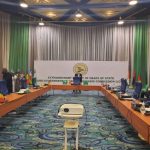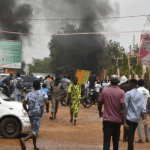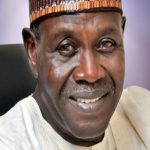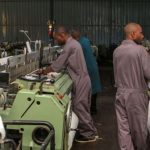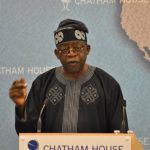Article 81 of the Constitution of Chad stipulates that “In case of vacancy of the Presidency of the Republic for any cause, … the duties of the President of the Republic, … are provisionally exercised by the President of the National Assembly … In every case, it proceeds to new presidential elections at least forty-five (45) days and ninety (90) days at most after the vacancy is opened.”
Yet, when Idriss Déby died on April 20, 2021, the military put his son, Gen Mahamat “Kaka” Déby Itno, a four-star general in his place. Debby died at the battle front in launching an attack against the FACT (Front pour l’alternance et la concorde au Tchad) mounted a border attack from Libya, just a day after provisional election results projected he would win a sixth term in office at the helm of the country. Immediately, afterwards, the government and parliament were dissolved, contrary to clear dictates of the Chadian Constitution (for example, article 95 thereof).
This action, which clearly constitutes a coup d’état has been endorsed by one of the major superpowers in the sub-region, Nigeria. In a BBC interview, its Foreign Minister, Geoffrey Onyeama, indicated that it was a necessity, in the face of the security threat Chad faces, to “avoid a power vacuum.” France, the former colonial authority which continues to rule Chad remotely from Paris, has also agreed to this formular, even claiming that the President of the National Assembly “refused” to take up that position.
Yet, in 2000, the then OAU, before its demise, instituted the Lomé Declaration on Unconstitutional Changes in Government. One of the grounds for unconstitutional changes is a coup d’état, as has been committed by the Chadian military, and which, therefore, should be condemned by the AU and its Peace and Security Council. The AU is further mandated to refuse recognition to this government until the President of the National Assembly is made the acting President.
Yet, as things stand, the message is that democracy and stability are odd fellows, at least in the case of Chad. However, isn’t it rather the case that the absence of a democratic space, which has allowed Debby to be in power for over 30 odd years is rather responsible for the instability? While we regret the death of Debby, his demise presents an opportunity for Chad to enjoy some semblance of people-centred democracy for the first time in their lives. Yet, this opportunity is being hacked away in the name of stability while in reality, it is only a disguise to promote dynastic democracy in Chad.
For now, I can only say “nice job” by the military for photocopying the dynastic rule formular orchestrated in Togo after the demise of Eyadema. And congratulations to Nigeria, all other African countries including my own country Ghana, the AU, ECOWAS (which have all remained silent up to this point and therefore are complicit in this unconstitutional overture; and for playing double standards). Big plaudits also to colonial master France, for putting stability ahead of democracy. Perhaps to France, it is a clear indication that they don’t trust the kind of caricatured democracy they imposed on African countries after the fall of the Berlin Wall.
However, this formular will not work. The way to peace and stability in Chad is for the President of the National Assembly to assume office, immediately call for a ceasefire with FACT and other rebel movements and initiate a national dialogue to bring peace and reconciliation to the country.
Article 81 of the Constitution of Chad stipulates that “In case of vacancy of the Presidency of the Republic for any cause, … the duties of the President of the Republic, … are provisionally exercised by the President of the National Assembly … In every case, it proceeds to new presidential elections at least forty-five (45) days and ninety (90) days at most after the vacancy is opened.”
Yet, when Idriss Déby died on April 20, 2021, the military put his son, Gen Mahamat “Kaka” Déby Itno, a four-star general in his place. Debby died at the battle front in launching an attack against the FACT (Front pour l’alternance et la concorde au Tchad) mounted a border attack from Libya, just a day after provisional election results projected he would win a sixth term in office at the helm of the country. Immediately, afterwards, the government and parliament were dissolved, contrary to clear dictates of the Chadian Constitution (for example, article 95 thereof).
This action, which clearly constitutes a coup d’état has been endorsed by one of the major superpowers in the sub-region, Nigeria. In a BBC interview, its Foreign Minister, Geoffrey Onyeama, indicated that it was a necessity, in the face of the security threat Chad faces, to “avoid a power vacuum.” France, the former colonial authority which continues to rule Chad remotely from Paris, has also agreed to this formular, even claiming that the President of the National Assembly “refused” to take up that position.
Yet, in 2000, the then OAU, before its demise, instituted the Lomé Declaration on Unconstitutional Changes in Government. One of the grounds for unconstitutional changes is a coup d’état, as has been committed by the Chadian military, and which, therefore, should be condemned by the AU and its Peace and Security Council. The AU is further mandated to refuse recognition to this government until the President of the National Assembly is made the acting President.
Yet, as things stand, the message is that democracy and stability are odd fellows, at least in the case of Chad. However, isn’t it rather the case that the absence of a democratic space, which has allowed Debby to be in power for over 30 odd years is rather responsible for the instability? While we regret the death of Debby, his demise presents an opportunity for Chad to enjoy some semblance of people-centred democracy for the first time in their lives. Yet, this opportunity is being hacked away in the name of stability while in reality, it is only a disguise to promote dynastic democracy in Chad.
For now, I can only say “nice job” by the military for photocopying the dynastic rule formular orchestrated in Togo after the demise of Eyadema. And congratulations to Nigeria, all other African countries including my own country Ghana, the AU, ECOWAS (which have all remained silent up to this point and therefore are complicit in this unconstitutional overture; and for playing double standards). Big plaudits also to colonial master France, for putting stability ahead of democracy. Perhaps to France, it is a clear indication that they don’t trust the kind of caricatured democracy they imposed on African countries after the fall of the Berlin Wall.
However, this formular will not work. The way to peace and stability in Chad is for the President of the National Assembly to assume office, immediately call for a ceasefire with FACT and other rebel movements and initiate a national dialogue to bring peace and reconciliation to the country.
Article 81 of the Constitution of Chad stipulates that “In case of vacancy of the Presidency of the Republic for any cause, … the duties of the President of the Republic, … are provisionally exercised by the President of the National Assembly … In every case, it proceeds to new presidential elections at least forty-five (45) days and ninety (90) days at most after the vacancy is opened.”
Yet, when Idriss Déby died on April 20, 2021, the military put his son, Gen Mahamat “Kaka” Déby Itno, a four-star general in his place. Debby died at the battle front in launching an attack against the FACT (Front pour l’alternance et la concorde au Tchad) mounted a border attack from Libya, just a day after provisional election results projected he would win a sixth term in office at the helm of the country. Immediately, afterwards, the government and parliament were dissolved, contrary to clear dictates of the Chadian Constitution (for example, article 95 thereof).
This action, which clearly constitutes a coup d’état has been endorsed by one of the major superpowers in the sub-region, Nigeria. In a BBC interview, its Foreign Minister, Geoffrey Onyeama, indicated that it was a necessity, in the face of the security threat Chad faces, to “avoid a power vacuum.” France, the former colonial authority which continues to rule Chad remotely from Paris, has also agreed to this formular, even claiming that the President of the National Assembly “refused” to take up that position.
Yet, in 2000, the then OAU, before its demise, instituted the Lomé Declaration on Unconstitutional Changes in Government. One of the grounds for unconstitutional changes is a coup d’état, as has been committed by the Chadian military, and which, therefore, should be condemned by the AU and its Peace and Security Council. The AU is further mandated to refuse recognition to this government until the President of the National Assembly is made the acting President.
Yet, as things stand, the message is that democracy and stability are odd fellows, at least in the case of Chad. However, isn’t it rather the case that the absence of a democratic space, which has allowed Debby to be in power for over 30 odd years is rather responsible for the instability? While we regret the death of Debby, his demise presents an opportunity for Chad to enjoy some semblance of people-centred democracy for the first time in their lives. Yet, this opportunity is being hacked away in the name of stability while in reality, it is only a disguise to promote dynastic democracy in Chad.
For now, I can only say “nice job” by the military for photocopying the dynastic rule formular orchestrated in Togo after the demise of Eyadema. And congratulations to Nigeria, all other African countries including my own country Ghana, the AU, ECOWAS (which have all remained silent up to this point and therefore are complicit in this unconstitutional overture; and for playing double standards). Big plaudits also to colonial master France, for putting stability ahead of democracy. Perhaps to France, it is a clear indication that they don’t trust the kind of caricatured democracy they imposed on African countries after the fall of the Berlin Wall.
However, this formular will not work. The way to peace and stability in Chad is for the President of the National Assembly to assume office, immediately call for a ceasefire with FACT and other rebel movements and initiate a national dialogue to bring peace and reconciliation to the country.
Article 81 of the Constitution of Chad stipulates that “In case of vacancy of the Presidency of the Republic for any cause, … the duties of the President of the Republic, … are provisionally exercised by the President of the National Assembly … In every case, it proceeds to new presidential elections at least forty-five (45) days and ninety (90) days at most after the vacancy is opened.”
Yet, when Idriss Déby died on April 20, 2021, the military put his son, Gen Mahamat “Kaka” Déby Itno, a four-star general in his place. Debby died at the battle front in launching an attack against the FACT (Front pour l’alternance et la concorde au Tchad) mounted a border attack from Libya, just a day after provisional election results projected he would win a sixth term in office at the helm of the country. Immediately, afterwards, the government and parliament were dissolved, contrary to clear dictates of the Chadian Constitution (for example, article 95 thereof).
This action, which clearly constitutes a coup d’état has been endorsed by one of the major superpowers in the sub-region, Nigeria. In a BBC interview, its Foreign Minister, Geoffrey Onyeama, indicated that it was a necessity, in the face of the security threat Chad faces, to “avoid a power vacuum.” France, the former colonial authority which continues to rule Chad remotely from Paris, has also agreed to this formular, even claiming that the President of the National Assembly “refused” to take up that position.
Yet, in 2000, the then OAU, before its demise, instituted the Lomé Declaration on Unconstitutional Changes in Government. One of the grounds for unconstitutional changes is a coup d’état, as has been committed by the Chadian military, and which, therefore, should be condemned by the AU and its Peace and Security Council. The AU is further mandated to refuse recognition to this government until the President of the National Assembly is made the acting President.
Yet, as things stand, the message is that democracy and stability are odd fellows, at least in the case of Chad. However, isn’t it rather the case that the absence of a democratic space, which has allowed Debby to be in power for over 30 odd years is rather responsible for the instability? While we regret the death of Debby, his demise presents an opportunity for Chad to enjoy some semblance of people-centred democracy for the first time in their lives. Yet, this opportunity is being hacked away in the name of stability while in reality, it is only a disguise to promote dynastic democracy in Chad.
For now, I can only say “nice job” by the military for photocopying the dynastic rule formular orchestrated in Togo after the demise of Eyadema. And congratulations to Nigeria, all other African countries including my own country Ghana, the AU, ECOWAS (which have all remained silent up to this point and therefore are complicit in this unconstitutional overture; and for playing double standards). Big plaudits also to colonial master France, for putting stability ahead of democracy. Perhaps to France, it is a clear indication that they don’t trust the kind of caricatured democracy they imposed on African countries after the fall of the Berlin Wall.
However, this formular will not work. The way to peace and stability in Chad is for the President of the National Assembly to assume office, immediately call for a ceasefire with FACT and other rebel movements and initiate a national dialogue to bring peace and reconciliation to the country.
Article 81 of the Constitution of Chad stipulates that “In case of vacancy of the Presidency of the Republic for any cause, … the duties of the President of the Republic, … are provisionally exercised by the President of the National Assembly … In every case, it proceeds to new presidential elections at least forty-five (45) days and ninety (90) days at most after the vacancy is opened.”
Yet, when Idriss Déby died on April 20, 2021, the military put his son, Gen Mahamat “Kaka” Déby Itno, a four-star general in his place. Debby died at the battle front in launching an attack against the FACT (Front pour l’alternance et la concorde au Tchad) mounted a border attack from Libya, just a day after provisional election results projected he would win a sixth term in office at the helm of the country. Immediately, afterwards, the government and parliament were dissolved, contrary to clear dictates of the Chadian Constitution (for example, article 95 thereof).
This action, which clearly constitutes a coup d’état has been endorsed by one of the major superpowers in the sub-region, Nigeria. In a BBC interview, its Foreign Minister, Geoffrey Onyeama, indicated that it was a necessity, in the face of the security threat Chad faces, to “avoid a power vacuum.” France, the former colonial authority which continues to rule Chad remotely from Paris, has also agreed to this formular, even claiming that the President of the National Assembly “refused” to take up that position.
Yet, in 2000, the then OAU, before its demise, instituted the Lomé Declaration on Unconstitutional Changes in Government. One of the grounds for unconstitutional changes is a coup d’état, as has been committed by the Chadian military, and which, therefore, should be condemned by the AU and its Peace and Security Council. The AU is further mandated to refuse recognition to this government until the President of the National Assembly is made the acting President.
Yet, as things stand, the message is that democracy and stability are odd fellows, at least in the case of Chad. However, isn’t it rather the case that the absence of a democratic space, which has allowed Debby to be in power for over 30 odd years is rather responsible for the instability? While we regret the death of Debby, his demise presents an opportunity for Chad to enjoy some semblance of people-centred democracy for the first time in their lives. Yet, this opportunity is being hacked away in the name of stability while in reality, it is only a disguise to promote dynastic democracy in Chad.
For now, I can only say “nice job” by the military for photocopying the dynastic rule formular orchestrated in Togo after the demise of Eyadema. And congratulations to Nigeria, all other African countries including my own country Ghana, the AU, ECOWAS (which have all remained silent up to this point and therefore are complicit in this unconstitutional overture; and for playing double standards). Big plaudits also to colonial master France, for putting stability ahead of democracy. Perhaps to France, it is a clear indication that they don’t trust the kind of caricatured democracy they imposed on African countries after the fall of the Berlin Wall.
However, this formular will not work. The way to peace and stability in Chad is for the President of the National Assembly to assume office, immediately call for a ceasefire with FACT and other rebel movements and initiate a national dialogue to bring peace and reconciliation to the country.
Article 81 of the Constitution of Chad stipulates that “In case of vacancy of the Presidency of the Republic for any cause, … the duties of the President of the Republic, … are provisionally exercised by the President of the National Assembly … In every case, it proceeds to new presidential elections at least forty-five (45) days and ninety (90) days at most after the vacancy is opened.”
Yet, when Idriss Déby died on April 20, 2021, the military put his son, Gen Mahamat “Kaka” Déby Itno, a four-star general in his place. Debby died at the battle front in launching an attack against the FACT (Front pour l’alternance et la concorde au Tchad) mounted a border attack from Libya, just a day after provisional election results projected he would win a sixth term in office at the helm of the country. Immediately, afterwards, the government and parliament were dissolved, contrary to clear dictates of the Chadian Constitution (for example, article 95 thereof).
This action, which clearly constitutes a coup d’état has been endorsed by one of the major superpowers in the sub-region, Nigeria. In a BBC interview, its Foreign Minister, Geoffrey Onyeama, indicated that it was a necessity, in the face of the security threat Chad faces, to “avoid a power vacuum.” France, the former colonial authority which continues to rule Chad remotely from Paris, has also agreed to this formular, even claiming that the President of the National Assembly “refused” to take up that position.
Yet, in 2000, the then OAU, before its demise, instituted the Lomé Declaration on Unconstitutional Changes in Government. One of the grounds for unconstitutional changes is a coup d’état, as has been committed by the Chadian military, and which, therefore, should be condemned by the AU and its Peace and Security Council. The AU is further mandated to refuse recognition to this government until the President of the National Assembly is made the acting President.
Yet, as things stand, the message is that democracy and stability are odd fellows, at least in the case of Chad. However, isn’t it rather the case that the absence of a democratic space, which has allowed Debby to be in power for over 30 odd years is rather responsible for the instability? While we regret the death of Debby, his demise presents an opportunity for Chad to enjoy some semblance of people-centred democracy for the first time in their lives. Yet, this opportunity is being hacked away in the name of stability while in reality, it is only a disguise to promote dynastic democracy in Chad.
For now, I can only say “nice job” by the military for photocopying the dynastic rule formular orchestrated in Togo after the demise of Eyadema. And congratulations to Nigeria, all other African countries including my own country Ghana, the AU, ECOWAS (which have all remained silent up to this point and therefore are complicit in this unconstitutional overture; and for playing double standards). Big plaudits also to colonial master France, for putting stability ahead of democracy. Perhaps to France, it is a clear indication that they don’t trust the kind of caricatured democracy they imposed on African countries after the fall of the Berlin Wall.
However, this formular will not work. The way to peace and stability in Chad is for the President of the National Assembly to assume office, immediately call for a ceasefire with FACT and other rebel movements and initiate a national dialogue to bring peace and reconciliation to the country.
Article 81 of the Constitution of Chad stipulates that “In case of vacancy of the Presidency of the Republic for any cause, … the duties of the President of the Republic, … are provisionally exercised by the President of the National Assembly … In every case, it proceeds to new presidential elections at least forty-five (45) days and ninety (90) days at most after the vacancy is opened.”
Yet, when Idriss Déby died on April 20, 2021, the military put his son, Gen Mahamat “Kaka” Déby Itno, a four-star general in his place. Debby died at the battle front in launching an attack against the FACT (Front pour l’alternance et la concorde au Tchad) mounted a border attack from Libya, just a day after provisional election results projected he would win a sixth term in office at the helm of the country. Immediately, afterwards, the government and parliament were dissolved, contrary to clear dictates of the Chadian Constitution (for example, article 95 thereof).
This action, which clearly constitutes a coup d’état has been endorsed by one of the major superpowers in the sub-region, Nigeria. In a BBC interview, its Foreign Minister, Geoffrey Onyeama, indicated that it was a necessity, in the face of the security threat Chad faces, to “avoid a power vacuum.” France, the former colonial authority which continues to rule Chad remotely from Paris, has also agreed to this formular, even claiming that the President of the National Assembly “refused” to take up that position.
Yet, in 2000, the then OAU, before its demise, instituted the Lomé Declaration on Unconstitutional Changes in Government. One of the grounds for unconstitutional changes is a coup d’état, as has been committed by the Chadian military, and which, therefore, should be condemned by the AU and its Peace and Security Council. The AU is further mandated to refuse recognition to this government until the President of the National Assembly is made the acting President.
Yet, as things stand, the message is that democracy and stability are odd fellows, at least in the case of Chad. However, isn’t it rather the case that the absence of a democratic space, which has allowed Debby to be in power for over 30 odd years is rather responsible for the instability? While we regret the death of Debby, his demise presents an opportunity for Chad to enjoy some semblance of people-centred democracy for the first time in their lives. Yet, this opportunity is being hacked away in the name of stability while in reality, it is only a disguise to promote dynastic democracy in Chad.
For now, I can only say “nice job” by the military for photocopying the dynastic rule formular orchestrated in Togo after the demise of Eyadema. And congratulations to Nigeria, all other African countries including my own country Ghana, the AU, ECOWAS (which have all remained silent up to this point and therefore are complicit in this unconstitutional overture; and for playing double standards). Big plaudits also to colonial master France, for putting stability ahead of democracy. Perhaps to France, it is a clear indication that they don’t trust the kind of caricatured democracy they imposed on African countries after the fall of the Berlin Wall.
However, this formular will not work. The way to peace and stability in Chad is for the President of the National Assembly to assume office, immediately call for a ceasefire with FACT and other rebel movements and initiate a national dialogue to bring peace and reconciliation to the country.
Article 81 of the Constitution of Chad stipulates that “In case of vacancy of the Presidency of the Republic for any cause, … the duties of the President of the Republic, … are provisionally exercised by the President of the National Assembly … In every case, it proceeds to new presidential elections at least forty-five (45) days and ninety (90) days at most after the vacancy is opened.”
Yet, when Idriss Déby died on April 20, 2021, the military put his son, Gen Mahamat “Kaka” Déby Itno, a four-star general in his place. Debby died at the battle front in launching an attack against the FACT (Front pour l’alternance et la concorde au Tchad) mounted a border attack from Libya, just a day after provisional election results projected he would win a sixth term in office at the helm of the country. Immediately, afterwards, the government and parliament were dissolved, contrary to clear dictates of the Chadian Constitution (for example, article 95 thereof).
This action, which clearly constitutes a coup d’état has been endorsed by one of the major superpowers in the sub-region, Nigeria. In a BBC interview, its Foreign Minister, Geoffrey Onyeama, indicated that it was a necessity, in the face of the security threat Chad faces, to “avoid a power vacuum.” France, the former colonial authority which continues to rule Chad remotely from Paris, has also agreed to this formular, even claiming that the President of the National Assembly “refused” to take up that position.
Yet, in 2000, the then OAU, before its demise, instituted the Lomé Declaration on Unconstitutional Changes in Government. One of the grounds for unconstitutional changes is a coup d’état, as has been committed by the Chadian military, and which, therefore, should be condemned by the AU and its Peace and Security Council. The AU is further mandated to refuse recognition to this government until the President of the National Assembly is made the acting President.
Yet, as things stand, the message is that democracy and stability are odd fellows, at least in the case of Chad. However, isn’t it rather the case that the absence of a democratic space, which has allowed Debby to be in power for over 30 odd years is rather responsible for the instability? While we regret the death of Debby, his demise presents an opportunity for Chad to enjoy some semblance of people-centred democracy for the first time in their lives. Yet, this opportunity is being hacked away in the name of stability while in reality, it is only a disguise to promote dynastic democracy in Chad.
For now, I can only say “nice job” by the military for photocopying the dynastic rule formular orchestrated in Togo after the demise of Eyadema. And congratulations to Nigeria, all other African countries including my own country Ghana, the AU, ECOWAS (which have all remained silent up to this point and therefore are complicit in this unconstitutional overture; and for playing double standards). Big plaudits also to colonial master France, for putting stability ahead of democracy. Perhaps to France, it is a clear indication that they don’t trust the kind of caricatured democracy they imposed on African countries after the fall of the Berlin Wall.
However, this formular will not work. The way to peace and stability in Chad is for the President of the National Assembly to assume office, immediately call for a ceasefire with FACT and other rebel movements and initiate a national dialogue to bring peace and reconciliation to the country.



